Heel Pain Visits Increase in Podiatrist Offices during the Summer
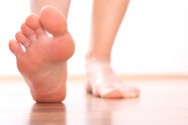 During the summer months many patients seem to experience an increase in heel pain. This often occurs due to walking barefoot, wearing unsupportive flip-flops, and an increase in exercise or outdoor activities such as running putting a huge strain on the plantar fascia. Most doctors would recommend icing or stretching the area in addition to regularly wearing orthotics; however, surgery is an option if all else fails.
During the summer months many patients seem to experience an increase in heel pain. This often occurs due to walking barefoot, wearing unsupportive flip-flops, and an increase in exercise or outdoor activities such as running putting a huge strain on the plantar fascia. Most doctors would recommend icing or stretching the area in addition to regularly wearing orthotics; however, surgery is an option if all else fails.
Anyone can wind up suffering from heel pain. If your heel is hurting, see Dr. Joshua David Scoll of Pennsylvania. Our doctorwill treat your heel pain symptoms in addition to other podiatric-related needs.
Causes of Heel Pain
● Heel pain is often associated with plantar fasciitis. The plantar fascia is a band of tissues that extends along the bottom of the foot. A rip or tear in this ligament can cause inflammation of the tissue.
● Achilles tendonitis is another cause of heel pain. Inflammation of the Achilles tendon will cause pain from fractures and muscle tearing. Lack of flexibility is also another symptom.
● Heel spurs are another cause of pain. When the tissues of the plantar fascia undergo a great deal of stress, it can lead to ligament separation from the heel bone, causing heel spurs.
Why Might Heel Pain Occur?
- Wearing ill-fitting shoes
- Wearing non-supportive shoes
- Weight change
- Excessive running
Treatments
Heel pain should be treated as soon as possible for immediate results. Keeping your feet in a stress free environment will help. If you suffer from Achilles tendonitis or plantar fasciitis, applying ice will reduce the swelling. Stretching before an exercise like running will help the muscles. Using all these tips will help make heel pain a thing of the past.
With the advancements in technology and greater knowledge of how muscles and joints work, physical therapists can turn things around dramatically.
If you have any questions, please feel free to contact our offices in Philadelphia and Bensalem, PA. We offer the newest diagnostic and treatment technologies for all your foot care needs.
Lamar Holmes Breaks Foot During Minicamp
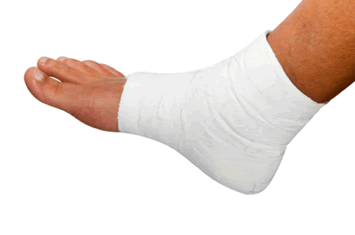 Lamar Holmes of the Atlanta Falcons will be out indefinitely due to a broken foot. The offensive tackle sustained the injury on the first day of minicamp, making him the second offensive tackle to be off on an injury next to starter Jake Matthews. “Don’t know any information in regard to training camp and him coming back. Disappointed for him. He’s had a terrific offseason. Hopefully a speedy recovery,” stated coach Dan Quinn. In the meantime the Falcons will most likely sign on a waiver if Holmes cannot recover on time.
Lamar Holmes of the Atlanta Falcons will be out indefinitely due to a broken foot. The offensive tackle sustained the injury on the first day of minicamp, making him the second offensive tackle to be off on an injury next to starter Jake Matthews. “Don’t know any information in regard to training camp and him coming back. Disappointed for him. He’s had a terrific offseason. Hopefully a speedy recovery,” stated coach Dan Quinn. In the meantime the Falcons will most likely sign on a waiver if Holmes cannot recover on time.
A broken foot requires immediate medical attention and treatment. If you are seeking treatment for a broken foot, visit Dr. Joshua David Scoll of Pennsylvania. Our doctor will assess your injury and provide you with quality treatment.
Broken Foot Causes, Symptoms, and Treatment
A broken foot is caused by one of the bones in the foot typically breaking when bended, crushed, or stretched beyond its natural capabilities. Usually the location of the fracture indicates how the break occurred, whether it was through an object, fall, or any other type of injury.
Common Symptoms of Broken Feet:
- Bruising
- Pain
- Redness
- Swelling
- Blue (foot)
- Numbness
- Cold
- Misshapen
- Cuts
- Deformities
Those that suspect they have a broken foot shoot seek urgent medical attention where a medical professional could diagnose the severity.
Treatment for broken bones varies depending on the cause, severity and location. Some will require the use of splints, casts or crutches while others could even involve surgery to repair the broken bones. Personal care includes the use of ice and keeping the foot stabilized and elevated.
If you have any questions please feel free to contact our offices located in Philadelphia and Bensalem, PA. We offer the newest diagnostic tools and technologies to treat your foot and ankle needs.
Maki Tall Must Sit out of the U-20 World Cup due to Broken Toe
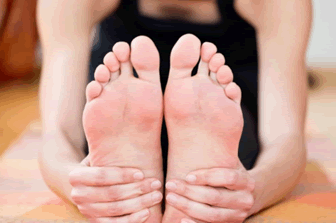 Maki Tall, starting striker for the United States men U-20 soccer team, will miss the rest of the U-20 World Cup due to a broken toe. Tall will be off of the field for six to eight weeks to heal, just enough time to be ready for the club season with Lille. This is a devastating injury for the US team, since the striker is a central part of the team. Coach Tab Ramos’ is in a tough spot for the remainder of the cup since there just is not another player that can compare to tall.
Maki Tall, starting striker for the United States men U-20 soccer team, will miss the rest of the U-20 World Cup due to a broken toe. Tall will be off of the field for six to eight weeks to heal, just enough time to be ready for the club season with Lille. This is a devastating injury for the US team, since the striker is a central part of the team. Coach Tab Ramos’ is in a tough spot for the remainder of the cup since there just is not another player that can compare to tall.
A broken toe can be very painful and lead to complications if not properly fixed. If you have any concerns contact Dr. Joshua David Scoll of Pennsylvania. Our doctor will treat your foot and ankle needs.
What to Know About a Broken Toe
Although most people try to avoid foot trauma such as banging, stubbing, or dropping heavy objects on their feet, the unfortunate fact is that it is a common occurrence. Given the fact that toes are positioned in front of the feet, they typically sustain the brunt of such trauma. When trauma occurs to a toe, the result can be a painful break (fracture).
Symptoms of a Broken Toe
- throbbing pain
- swelling
- bruising on the skin and toenail
- the inability to move the toe
- toe appears crooked or disfigured
- tingling or numbness in the toe
Generally, it is best to stay off of the injured toe with the affected foot elevated.
Severe toe fractures may be treated with a splint, cast, and in some cases, minor surgery. Due to its position and the pressure it endures with daily activity, future complications can occur if the big toe is not properly treated.
If you have any concerns please feel free to contact our offices located in Philadelphia and Bensalem, PA. We offer the newest diagnostic tools and technology to treat your foot and ankle needs.
Hci Viocare Developing Smart Insole to Better Understand Diabetic Nerve Damage
 Nerve disorders are a big problem for people suffering from diabetes today. Researchers at Hci Viocare have been developing something called The Smart Insole for diabetic patients to wear inside of the shoes to send data or feedback to a smart device for analysis. The device works through monitoring stresses on the feet that may cause long-term issues with the nerves and feet. The Smart Sole studies have shown that the insoles have been proven to prevent ulcers and can monitor blood glucose needs.
Nerve disorders are a big problem for people suffering from diabetes today. Researchers at Hci Viocare have been developing something called The Smart Insole for diabetic patients to wear inside of the shoes to send data or feedback to a smart device for analysis. The device works through monitoring stresses on the feet that may cause long-term issues with the nerves and feet. The Smart Sole studies have shown that the insoles have been proven to prevent ulcers and can monitor blood glucose needs.
Nerve problems in diabetic patients are increasingly common. If you have any concerns about your diabetic feet contact Dr. Joshua David Scoll of Pennsylvania. Our doctor will treat your foot and ankle needs.
Diabetic Foot Care
Diabetes affects millions of people every year. Diabetes can damage blood vessels in many parts of the body, including the feet. Because of this, taking care of your feet is essential if you have diabetes, and having a podiatrist help monitor your foot health is highly recommended.
The Importance of Caring for Your Feet
- Routinely inspect your feet for bruises or sores.
- Wear socks that fit your feet comfortably.
- Wear comfortable shoes that provide adequate support.
Patients with diabetes should have their doctor monitor their blood levels because blood sugar levels play such a huge role in diabetic care. Monitoring these levels on a regular basis is highly advised.
It is always best to inform your healthcare professional of any concerns you may have regarding your feet, especially for diabetic patients. Early treatment and routine foot examinations are keys to maintaining proper health, especially because severe complications can arise if proper treatment is not applied.
If you have any questions please feel free to contact our offices located in Philadelphia and Bensalem, PA. We offer the newest diagnostic tools and technology to treat your foot and ankle needs.
Steps to Cope with Arthritis
 Arthritis affects approximately 52 million people in the United States—and these are the people officially diagnosed by a physician. Those suffering from arthritis and its symptoms, however, can benefit from several steps to help cope with the condition. The first steps one can take involve learning more about the condition, knowing what kind of arthritis one has, and responding to prolonged symptoms by seeing a physician. Excess weight can add pressure on the joints—especially the feet; therefore exercising, losing weight, and leading an active lifestyle is important. Protect the joints by avoiding using the same joints constantly and alternating movement. Rest and relaxation is also important to avoid straining affected areas.
Arthritis affects approximately 52 million people in the United States—and these are the people officially diagnosed by a physician. Those suffering from arthritis and its symptoms, however, can benefit from several steps to help cope with the condition. The first steps one can take involve learning more about the condition, knowing what kind of arthritis one has, and responding to prolonged symptoms by seeing a physician. Excess weight can add pressure on the joints—especially the feet; therefore exercising, losing weight, and leading an active lifestyle is important. Protect the joints by avoiding using the same joints constantly and alternating movement. Rest and relaxation is also important to avoid straining affected areas.
The feet are one of the most common sites for arthritis to occur in the body. If you are struggling with arthritis in your feet or ankles, call Dr. Joshua David Scoll of Pennsylvania. Our doctor can examine your lower extremities to help alleviate your joint pain.
Arthritic Foot Care
Arthritis is a joint disorder that involves inflammation of different joints in your body, such as in your feet. Arthritis is often caused by a degenerative joint disease and causes mild to severe pain in all affected areas. On top of this, swelling and stiffness in the affected joints can also be a common symptom of arthritis.
In many cases, wearing ill-fitting shoes can worsen the effects and pain of arthritis. Wearing shoes that have a lower heel and extra room can help your feet feel more comfortable. In cases of rheumatoid arthritis, the arch in your foot may become problematic. Buying shoes with proper arch support that contour to your feet can help immensely.
Alleviating Arthritic Pain
- Exercises that stretch the foot can prevent further pain and injury and increase mobility
- Most of the pain can be alleviated with anti-inflammatory drugs, heat, and topical medications
- Massages can help to temporarily alleviate pain.
It is best to see your doctor for the treatment that is right for your needs and symptoms. Conditions vary, and a podiatrist can help you determine the right method of care for your feet.
EU Funds Adjustable Women’s Shoe
 The European Union has been funding project Demo ShopInstantShoe, the development of a woman’s shoe that adjusts based on a memory shape composite of leather and Nitinol materials. The materials allow for fitting and immediate personalization in store with the help of the “Shoptool” that completes the process within minutes. Innovation Director of Footwear Juan Carlos Gonzalez states,” Anyone will be able to get the best fit, and if finally the client does not wish to buy the product, the shoe will recover the original shape by warming it up during a few seconds.” This project is directed towards women since most foot problems such as bunions and other deformities negatively affect women the most.
The European Union has been funding project Demo ShopInstantShoe, the development of a woman’s shoe that adjusts based on a memory shape composite of leather and Nitinol materials. The materials allow for fitting and immediate personalization in store with the help of the “Shoptool” that completes the process within minutes. Innovation Director of Footwear Juan Carlos Gonzalez states,” Anyone will be able to get the best fit, and if finally the client does not wish to buy the product, the shoe will recover the original shape by warming it up during a few seconds.” This project is directed towards women since most foot problems such as bunions and other deformities negatively affect women the most.
Proper footwear is important is preventing aching feet. For more information about everyday foot care, consult with Dr. Joshua David Scoll of Pennsylvania. Our doctorwill provide you with the foot- and ankle information you seek.
Every Day Foot Care
Often, people take care of their bodies, face and hair more so than they do for their feet. But the feet are a very important aspect of our bodies, and one that we should pay more attention to. After all, without our feet, we would not be able to perform most daily tasks. It is best to check your feet regularly to make sure there are no new bruises or cuts that you may not have noticed before, for example.
For dry feet, moisturizer can easily be a remedy and can be applied as often as necessary to the affected areas. Wearing shoes that fit well can also help you maintain good foot health, as well as making it easier to walk and do daily activities without the stress or pain of ill-fitting shoes, high heels, or even flip flops.
Also, wearing clean socks with closed shoes is important to ensure that sweat and bacteria do not accumulate within the shoe. Clean socks help to prevent athlete’s foot, fungi problems, bad odors, and can absorb sweat.
If you have any questions, please feel free to contact our office located in Philadelphia and Bensalem, PA. We offer the newest diagnostic and treatment technologies for all your foot and ankle injuries.
Link Between Foot Size and Obesity
 Laura West of theSociety of Shoe Fitters shares that there is a link between foot size and obesity. The Celtic foot, for example, is significantly broader than the rest of the United Kingdom’s feet. “Feet size is very much linked to obesity,” explains West, “and we see children wanting wider and wider footwear.” Matthew Fitzpatrick, Dean at the College of Podiatry, elaborates, “Increased weight puts more strain on the foot, especially so with the soft tissue of a child’s developing feet.”
Laura West of theSociety of Shoe Fitters shares that there is a link between foot size and obesity. The Celtic foot, for example, is significantly broader than the rest of the United Kingdom’s feet. “Feet size is very much linked to obesity,” explains West, “and we see children wanting wider and wider footwear.” Matthew Fitzpatrick, Dean at the College of Podiatry, elaborates, “Increased weight puts more strain on the foot, especially so with the soft tissue of a child’s developing feet.”
Any additional problems in the feet of those with obesity can be detrimental to foot health. If you have any concerns about your feet contact Dr. Joshua David Scoll of Pennsylvania. Our doctor will treat your foot and ankle needs.
Obesity and your Feet
Since your feet are what support your entire weight when standing, any additional weight can result in pain and swelling. Being overweight is one of the main contributors to foot complications.
Problems & Complications
Extra Weight – Even putting on just a few extra pounds could create serious complications for your feet. As your weight increases, your balance and body will shift, creating new stresses on your feet. This uneven weight distribution can cause pain, even while doing the simplest tasks, such as walking.
Diabetes – People who are overweight are at serious risk of developing type-2 diabetes, which has a drastic impact on the health of your feet. As you get older, your diabetes might worsen, which could lead to loss of feeling in your feet, sores, and bruises. You could also become more prone to various infections.
Solutions
Footwear – Specially made footwear that supports your joints, arches, and ankles, and allows room for good circulation is a great option to mitigate pressure and pain. A podiatrist will help you decide what works best for your specific needs.
Exercise – Exercise will help alleviate the pain and give your feet the strength it needs to support your body. Exercise also increases blood flow to your feet, allowing them to remain healthy and strong.
Most importantly, seek the help of a podiatrist for foot care if something is wrong or doesn’t seem to be working. A podiatrist will help you with any questions or information needed.
If you have any questions please feel free to contact our offices located in Philadelphia and Bensalem, PA. We offer the newest diagnostic tools and technology to treat your foot and ankle needs.
Four Steps to Preventing Running Injuries
 Kathleen Trotter, personal trainer and writer for the Huffington Post, has developed four steps to ensure injury free running.
Kathleen Trotter, personal trainer and writer for the Huffington Post, has developed four steps to ensure injury free running.
Step1: Make recovery top priority. Be sure schedule stretches, massages, and get enough rest for the body to recover after running.
Step 2: Listen to your body. If you are experiencing foot pain during your running session, don’t ignore the pain. Instead participate in another exercise that puts less pressure on the feet.
Step 3: Progress gradually. If you have spent all winter doing everything but running, it is not a good idea to start running at an extreme level. Instead work your way back into running for long periods of time.
Step 4: Do not just solely run. Since running is so hard on the body and puts a lot of stress on the joints, tendons, and ligaments, it is a good idea to mix up exercises by trying strength training, core training, stretching, and massaging to reduce these stresses.
Runners can still be prone to running injuries even with proper precautions. If you are suffering from a running injury see Dr. Joshua David Scoll of Pennsylvania. Our doctor will provide you with quality treatment and assist you with all of your foot and ankle concerns.
How to Prevent Running Injuries
Many common running injuries are caused by overuse and overtraining. When the back of the kneecap starts wearing out and starts causing pain in your knee, this is commonly referred to as runner’s knee. Runner’s knee is a decrease in strength in your quadriceps and can occur if you’re not wearing properly fitted or supporting shoes. To prevent runner’s knee, focusing on hip strengthening is a good idea, as well as strengthening your quads to keep the kneecaps aligned.
What Are Some Causes of Running Injuries?
- One cause of a common running injury is called iliotibial band syndrome.
- Plantar fasciitis is also another common injury.
- Stress fractures can occur from overtraining, lack of calcium, or even your running style.
Best Ways to Prevent Running Injuries
- Wear footwear that fits properly and suits your running needs.
- Running shoes are the only protective gear that runners have to safeguard them from injury.
- Make a training schedule. Adding strengthening exercises as well as regular stretching can help keep you strong and limber and can lessen the possibility of injuries.
- Stretching keeps muscles limber, this will help you gain better flexibility.
If you have any questions, please contact our offices located in Philadelphia and Bensalem, PA. We offer the newest diagnostic and treatment technologies for all your foot care needs.
Treatment for Flat Feet not always Necessary
 Flat feet occur through the over pronation of the foot, through a deformity at birth where the arch is typically flexible, or acquired over time when pressure is applied to the foot and the arch collapses. Improper footwear, foot abnormalities, or a ruptured tendon can all also lead to a flat foot. Typically if no pain is present, treatment may not be required other than wearing orthotics. However, if there is pain in a flat foot treatment can range from taping the foot, wearing custom orthotics, stretching, or fixing the ailment with surgery in extreme cases.
Flat feet occur through the over pronation of the foot, through a deformity at birth where the arch is typically flexible, or acquired over time when pressure is applied to the foot and the arch collapses. Improper footwear, foot abnormalities, or a ruptured tendon can all also lead to a flat foot. Typically if no pain is present, treatment may not be required other than wearing orthotics. However, if there is pain in a flat foot treatment can range from taping the foot, wearing custom orthotics, stretching, or fixing the ailment with surgery in extreme cases.
Living with flat feet does not always mean there will be a problem with them. If you are having trouble with your flat feet, speak to Dr. Joshua David Scoll of Pennsylvania. Our doctor will answer any of your foot and ankle related questions and attend to all of your podiatric needs.
What are Flat Feet?
Flat feet are a condition in which the arch of the foot is depressed and the sole of the foot is almost completely in contact with the ground. Standing about 20-30% of the population generally has flat feet because their arch never formed during growth.
Conditions & Problems:
Having flat feet makes it difficult to run or walk because of the stress placed on the ankles.
Alignment – The general alignment of your legs can be disrupted, because the ankles move inward which can cause major discomfort.
Knees – if you have complications with your knees, flat feet can be a contributor to arthritis in that area.
Symptoms:
- Pain around the heel or arch area
- Trouble standing on the tip toe.
- Swelling around the inside of the ankle.
- Flat look to one or both feet.
- Having your shoes feel uneven when worn
Treatment:
If you are experiencing pain and stress on the foot you may weaken the posterior tibial tendon, which runs around the inside of the ankle.
If you have any questions, please contact our offices located in Philadelphia and Bensalem, PA. We offer the newest diagnostic and treatment technologies for all your foot care needs.
Surgery Often Necessary in Treating Bunions
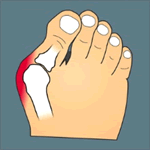 Hallux valgus, or more commonly known as bunions, occurs when the joint of the big toe turns into a large bump and the big toe starts to turn into the smaller toes. Accordingly, the foot condition occurs in nearly one in three adults and can occur due to family genetics and through improper footwear. Bunion treatment typically begins with non-surgical treatments such as wearing a shoe with a wider toe box or wearing pads over the bump to cushion the area. When nonsurgical treatments do not work, surgery is considered as a last resort. With the surgery come risks such as scarring, bunion recurrence, arthritis, and other ailments. Recovery usually takes up to 12 weeks and a protective sandal or boot is necessary for proper healing.
Hallux valgus, or more commonly known as bunions, occurs when the joint of the big toe turns into a large bump and the big toe starts to turn into the smaller toes. Accordingly, the foot condition occurs in nearly one in three adults and can occur due to family genetics and through improper footwear. Bunion treatment typically begins with non-surgical treatments such as wearing a shoe with a wider toe box or wearing pads over the bump to cushion the area. When nonsurgical treatments do not work, surgery is considered as a last resort. With the surgery come risks such as scarring, bunion recurrence, arthritis, and other ailments. Recovery usually takes up to 12 weeks and a protective sandal or boot is necessary for proper healing.
The pain and discomfort caused by bunions can put a halt to everyday activities. If you have any concerns contact podiatrist Dr. Joshua David Scoll of Pennsylvania. Our doctor will treat your foot and ankle needs.
What is a Bunion?
A bunion is formed of swollen tissue or an enlargement of boney growth, usually located at the base joint of the toe that connects to the foot. The swelling occurs by the bones in the big toe shifting inward, which impacts the other toes of the foot. This causes the area around the base of the big toe to become inflamed and painful.
Why do Bunions Form?
• Genetics – susceptibility to bunions are often hereditary
• Stress on the feet – poorly fitted and uncomfortable footwear that places stress on feet, such as heels, can cause bunions to form
How are Bunions Diagnosed?
Doctors often perform two tests – blood tests and x-rays – when trying to diagnose bunions, especially in the early stages of development. Blood tests help determine if the foot pain is being caused by something else, such as arthritis, while x-rays provide a clear picture of your bone structure to your doctor.
How are Bunions Treated?
• Refrain from wearing heels or similar shoes that cause discomfort
• Select wider shoes that can provide more comfort and reduce pain
• Anti-inflammatory and pain management drugs
• Orthotics or foot inserts
• Surgery
If you have any concerns please feel free to contact our offices located in Philadelphia and Bensalem, PA. We offer the newest diagnostic tools and technology to treat your foot and ankle needs.
Proper Foot Support the Key to Athleticism
 According to Huffington Post Healthy Living, the best forms of agility, speed, balance, and power start with a properly supported foot. Although athletic footwear is designed to support and protect the foot with standard shock absorption, it does not protect the natural biomechanic movement of the foot or abnormal pronation of the foot and joints.
According to Huffington Post Healthy Living, the best forms of agility, speed, balance, and power start with a properly supported foot. Although athletic footwear is designed to support and protect the foot with standard shock absorption, it does not protect the natural biomechanic movement of the foot or abnormal pronation of the foot and joints.
To fill that void, athletes can purchase arch supports that are inserted in the shoes specific to the sport they participate in. Having a stable lower half will increase overall performance and help athlete’s prevent injury.
Proper foot support is of utmost importance in foot health. To learn more, consult with podiatrist Dr. Joshua David Scoll of Pennsylvania. Our doctor will provide you with the foot and ankle information you seek.
The Importance of Proper Foot Support
Walking is an everyday function for both men and women, and in order to keep your body’s balance in order, you are going to need shoes that provide the proper kinds of support.
Poor foot support can cause pain and discomfort in the lower back, hips, knees, neck and shoulder. It also can lead to emotional stress, and physiological changes in the body. In order to avoid these problems, you must have proper foot support.
The arch is the most important part of the foot, which is where most of the support and balance of your feet lies. The arch of your foot varies in height, and as you age, this height can change. Proper foot support will help musculoskeletal issues, which causes inactivity or disability.
When looking for shoes that give proper support to your feet, you should refrain from wearing ill-fitting shoes. If footwear is too tight, this can affect the body’s posture, stress, bone deformities, and other foot and back pain. Therefore, it is important that shoes fit well in order to avoid these complications.
If you have any questions please feel free to contact our office located in Philadelphia and Bensalem, PA. We offer the newest diagnostic tools and technology to treat your foot and ankle needs.
Read more about Proper Foot Support
Understanding Biomechanics of the Feet Can Prevent Running Injuries
 Running is an important daily routine for many people; however, runners should keep in mind the biomechanics of the foot to prevent running injuries .
Running is an important daily routine for many people; however, runners should keep in mind the biomechanics of the foot to prevent running injuries .
The metatarsal bones are often regularly injured during the foot to ground impact when running with metatarsalgia, inflammation on the bottom of the foot.
The metatarsal bones are located in the forefoot and there are five, connecting to the mid-foot to the toes. The heaviness of the body and the impact on the foot result in symptoms such as sharp, stabbing, burning pain. Injury to the metatarsals can be reduced with smart training practices, proper fitting shoes, orthotics, and using recovery days to rest the feet.
Biomechanics of the feet can help you understand how to prevent injury and help doctors treat your foot and ankle ailments. If you have any concerns contact podiatrist Dr. Joshua David Scoll of Pennsylvania. Our doctor will treat your foot and ankle needs.
Biomechanics in Podiatry
Podiatric biomechanics is a particular sector of specialty podiatry with licensed practitioners who are trained to diagnose and treat conditions affecting the foot, ankle and lower leg. Biomechanics deals with the forces that act against the body causing an interference with the biological structure and focuses on the movement of the ankle, the foot and the forces that interact with them.
A History of Biomechanics
- Biomechanics dates back to the BC era in Egypt where evidence of professional foot care has been recorded.
- In 1974 biomechanics gained a higher profile from the studies of Merton Root, who claimed that by changing or controlling the forces between the ankle and the foot, corrections or conditions could be implemented to gain strength and coordination to the area.
Modern technology improvements are based on past theories and therapeutic processes providing a better understanding of podiatry concepts for biomechanics. Computers provide accurate determinations about the forces, moments and patterns of the foot and lower legs with the most important information captured.
Advances in materials and more awareness of biomechanics have developed enhanced corrective methods, offering further options for foot-related injuries. Understanding foot biomechanics can help improve and eliminate pain, stopping further stress to the foot.
If you have any questions please feel free to contact our office located in Philadelphia and Bensalem, PA. We offer the newest diagnostic tools and technology to treat your foot and ankle needs.
Read more about biomechanics of the feet.
The Standing Desk is the New Way to Work Out and Work
 The standing desk has recently taken office culture by storm for those that work regular nine to five hours and do not have the time to go to the gym every day. Experts say that this drastic change can have positive effects on overall health, but new pains in the feet may appear. Foot health professionals suggest that those making the change alternate between sitting and standing each day to balance the body and avoid any injuries.
The standing desk has recently taken office culture by storm for those that work regular nine to five hours and do not have the time to go to the gym every day. Experts say that this drastic change can have positive effects on overall health, but new pains in the feet may appear. Foot health professionals suggest that those making the change alternate between sitting and standing each day to balance the body and avoid any injuries.
It is also important to adjust office footwear; wearing comfortable flat shoes will be a better idea than wearing high heels all day.
While working on the feet, it is important to take the proper care of them. For more information about working on your feet contact Dr. Joshua David Scoll of Pennsylvania. Our doctors will treat your foot and ankle needs.
Working on Your Feet
Standing on your feet for long periods of time can cause stress and pain in your feet. Your whole body may experience change in terms of posture, back pain, bunions, callouses and or plantar warts. There are ways to avoid these conditions with proper foot care, smart choices and correct posture.
Positive Changes
Negative heeled shoe – choosing this shoe places the heel slightly lower than the ball of the foot. These are great for overall foot health. Find shoes that fit you correctly.
Go barefoot – our feet were not designed to be enclosed for hours, or all day. Try allowing yourself to expose your feet to air.
Eliminate Pain
Foot Exercises – performing simple exercises, incorporating yoga and stretches is beneficial. This will allow increased blood flow to the area and muscles of the foot.
Achilles tendon – stretching the foot out flat on the floor, will relax the calf muscles and tendon. These exercises can be performed almost anywhere. Make sure you add these exercises to your daily regimen.
With a little bit of this information and knowing more about foot health, you will notice changes. Foot stretches and proper footwear will help with pain and prevent further issues.
Keep your feet healthy and your body will thank you for it.
If you have any questions please feel free to contact our offices located in Philadelphia and Bensalem, PA. We offer the newest diagnostic and treatment technologies for all your foot and ankle needs.
Michigan State Star Suffers Injury during Game against Duke
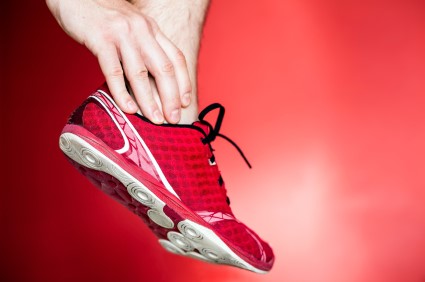 Michigan State’s Denzel Valentine suffered an ankle injury in the first half against North Carolina’s Duke University. Valentine returned to the second half of the game after receiving treatment from the medical staff when the opposing team took the lead 36-25.
Michigan State’s Denzel Valentine suffered an ankle injury in the first half against North Carolina’s Duke University. Valentine returned to the second half of the game after receiving treatment from the medical staff when the opposing team took the lead 36-25.
Valentine’s injury was something to watch during the second half of the game being that he is the second most important player on the offensive line. According to CBS the junior guard gutted it out and continued to play without limitation through the second half.
Sports related foot and ankle injuries need proper treatment before players can go back to their regular routines. If you have any concerns about your feet and ankles contact podiatrist Dr. Joshua David Scoll from Pennsylvania. Our doctor will treat your foot and ankle needs.
Sport Related Foot and Ankle Injuries
Foot and ankle injuries are a common occurrence when it comes to athletes of any sport. While many athletes dismiss the initial aches and pains, the truth is that ignoring potential foot and ankle injuries can lead to serious problems.
As athletes continue to place pressure and strain the area further, a mild injury can turn into something as serious as a rupture and may lead to a permanent disability.
There are many factors that contribute to sports related foot and ankle injuries, which include failure to warm up properly, not providing support or wearing bad footwear. Common injuries and conditions athletes face, including:
- Plantar Fasciitis
- Plantar Fasciosis
- Achilles Tendinitis
- Achilles Tendon Rupture
- Ankle Sprains
Sports-related injuries are commonly treated using the RICE method. This includes rest, applying ice to the injured area, compression and elevating the ankle. More serious sprains and injuries may require surgery, which could include arthroscopic and reconstructive surgery. Rehabilitation and therapy may also be required in order to get any recovering athlete to become fully functional again. Any unusual aches and pains an athlete sustains must be evaluated by a licensed, reputable medical professional.
If you have any questions please feel free to contact our offices located in Philadelphia and Bensalem, PA. We offer the newest technologies and diagnostic tools for your foot and ankle needs.
Stress Fracture Recovery Involves Patience
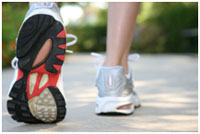 When runner Vicky Huber Rudawsky reinjured her stress fracture in her foot after putting too much pressure on it too soon, she learned a valuable lesson in patience. Once Huber Rudawsky was cleared by her doctor after waiting nearly a year to recover from her initial stress fracture she “hit the ground running” and immediately got back into heavy training.
When runner Vicky Huber Rudawsky reinjured her stress fracture in her foot after putting too much pressure on it too soon, she learned a valuable lesson in patience. Once Huber Rudawsky was cleared by her doctor after waiting nearly a year to recover from her initial stress fracture she “hit the ground running” and immediately got back into heavy training.
The runner should have gradually got back into her routine starting with low weight-bearing activities such as swimming. Another way to prevent or reduce the probability of a stress fracture includes cross training, the alternating of activities so no one area of the body faces the same stresses every day. Wearing shoes with proper support and incorporating calcium and vitamin D in your meals can also prevent stress fractures.
Stress fractures are painful and can keep runners off of their feet for a long period of time. If you think you have a stress fracture contact Dr. Joshua David Scoll of Pennsylvania. Our doctor will treat your foot and ankle needs.
Dealing with Stress Fractures of the Foot and Ankle
The Stress Fractures occur on the foot and ankle when muscles in these areas weaken from too much or too little use. Then the feet and ankles lose support when walking or running from the impact of the ground. Since there is no protection the bones receive the full impact of each step. The stress on the feet causes cracks to form in the bones, thus called stress fractures.
What are Stress Fractures?
Stress fractures occur frequently in individuals whose daily activities cause great impact on the feet and ankles. Stress factors are most common among:
-runners
-people affected with Osteoporosis
-play tennis or basketball
-gymnastics
-high impact workouts
Symptoms
Pain from the fractures occur in the area of the fractures, and can be constant or intermittent. It will often cause sharp or dull pain with swelling and tenderness. Engaging in any kind of activity which involves in high impact will aggravate pain.
Treatment
The individual and the degree of injury depend on the fracture of the foot. Some fractures heal very fast while others take a long times and one would need crutches.
- Surgery with support pins around the fracture helps
- A great intake of Calcium and Vitamin-D helps for strong bones
- Set a regimen for running or other activity
- Wear supportive shoes
If you experience any discomfort or stress stop what you are doing and get rest. If symptoms persist see an orthopedic specialist right away.
If you have any questions please contact our offices located in Philadelphia and Bensalem, PA. We offer the newest diagnostic and treatment technologies for all your foot and ankle needs.
Read more about stress fractures.
More...
Stephen Strasburg Misses Start of the Season with Sprained Ankle
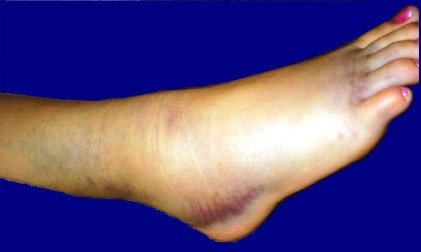 Stephen Strasburg, pitcher for the Washington Nationals, will miss the start of the season due to a sprained ankle. The injury occurred a few days before their game against the Tigers, but the pitcher still played against the Marlins where they won 4-2. Matt Williams, Nationals manager states, “We don’t want to have any issues with the arm trying to over compensate so we’ll push him a couple of days and he’ll be good. But it’s not serious.” Apparently Strasburg rolled his ankle during some conditioning which resulted in the injury.
Stephen Strasburg, pitcher for the Washington Nationals, will miss the start of the season due to a sprained ankle. The injury occurred a few days before their game against the Tigers, but the pitcher still played against the Marlins where they won 4-2. Matt Williams, Nationals manager states, “We don’t want to have any issues with the arm trying to over compensate so we’ll push him a couple of days and he’ll be good. But it’s not serious.” Apparently Strasburg rolled his ankle during some conditioning which resulted in the injury.
Ankle sprains are very painful and need to be treated as soon as possible. If you are suffering from a sprained ankle contact Dr. Joshua David Scoll of Pennsylvania. Our doctor will treat your foot and ankle needs.
How Does an Ankle Sprain Occur?
Ankle sprains take place when the ligaments in your ankle are torn or stretched beyond their limits. There are multiple ways that the ankle can become injured, including twisting or rolling over onto your ankle, putting undue stress on it, or causing trauma to the ankle itself.
What are the Symptoms?
- Mild to moderate bruising
- Limited mobility
- Swelling
- Discoloration of the skin (depending on severity)
Preventing a Sprain
- Wearing appropriate shoes for the occasion
- Stretching before exercises and sports
- Knowing your limits can aid in prevention
Treatment of a Sprain
Treatment of a sprain depends on the severity. Many times, people are told to rest and remain off their feet completely, while others are given an air cast. If the sprain is very severe, surgery may be required.
If you have suffered an ankle sprain previously, you may want to consider additional support such as a brace and regular exercises to strengthen the ankle.
If you have any questions, please feel free to contact our offices located in Bensalem and Philadelphia, PA. We offer the newest diagnostic and treatment technologies for all your foot and ankle needs.
Read More about ankle sprains.
3D-printed High Heel features Shock Absorbent Heel
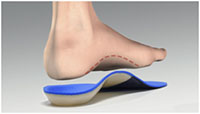 Designer and professional origami artist Kade Chan has combined traditional shoemaking methods with the 3Doodler pen to create a customized high heel shoe with a shock absorbent heel. The 3Doodler, created from a Kickstarter campaign, is a pen that can draw in 3D. Research firm Canalys is expecting the 3D printing market to grow to $16.2 billion by 2018. 3D printing proves to be the ultimate DIY market with the rapid advancements in the technology, the cost of 3D printers falling and the consumer’s desire to download and print anything they want.
Designer and professional origami artist Kade Chan has combined traditional shoemaking methods with the 3Doodler pen to create a customized high heel shoe with a shock absorbent heel. The 3Doodler, created from a Kickstarter campaign, is a pen that can draw in 3D. Research firm Canalys is expecting the 3D printing market to grow to $16.2 billion by 2018. 3D printing proves to be the ultimate DIY market with the rapid advancements in the technology, the cost of 3D printers falling and the consumer’s desire to download and print anything they want.
High heels are very fashionable and a necessity to some, but if worn in excess can cause pain to the feet and ankles. To learn more, contact Dr. Joshua David Scoll of Pennsylvania. Our doctor will answer all of your foot- and ankle-related questions.
Effects of High Heels on the Feet
High heels are popular shoes among women because they are associated with femininity. Despite their appeal, they can cause many health problems if worn too frequently.
What parts my body will be affected by high heels?
- Ankle Joints
- Achilles Tendon – may shorten and stiffen with prolonged wear
- Balls of the Feet
- Knees – heels cause the knees to bend constantly, creating stress on them
- Back – they decrease the spine’s ability to absorb shock, which may lead to back pain. Also, the vertebrae of the lower back may compress.
What kinds of foot problems can develop from wearing high heels?
- Corns
- Calluses
- Hammertoe
- Bunions
- Morton’s Neuroma
- Plantar Fasciitis
How can I still wear high heels and maintain foot health?
If you want to wear high heeled shoes, make sure that you are not wearing them every day, as this will help prevent long term physical problems. Try wearing thicker heels as opposed to stilettos to distribute weight more evenly across the feet. Always make sure you are wearing the proper shoes for the right occasion, such as sneakers for exercising. If you walk to work, try carrying your heels with you and changing into them once you arrive at work.
If you have any questions, please contact our offices located in Philadelphia and Bensalem, PA. We offer the newest diagnostic and treatment technologies for all your foot care needs.
Read more about the Effects of High Heels
Tips to Relieve Swollen Feet and Ankles during Pregnancy
 During pregnancy many women experience swelling of the feet, ankles, and other parts of the body; this swelling is known as edema or the buildup of the fluid inside of the tissues. Bold Sky has come up with a few ways to reduce swelling to make pregnancy a little bit easier. The consumption of salt is known to cause fluid retention in the body so drinking a lot of water and cutting down on salt intake will aid in the reduction of edema. When possible, rest your legs on an area that will make them higher than your waist when lying down. This will help stimulate the blood flow in the legs in feet. Try avoiding heat or adding a cold compress to the mix for added comfort and swelling reduction.
During pregnancy many women experience swelling of the feet, ankles, and other parts of the body; this swelling is known as edema or the buildup of the fluid inside of the tissues. Bold Sky has come up with a few ways to reduce swelling to make pregnancy a little bit easier. The consumption of salt is known to cause fluid retention in the body so drinking a lot of water and cutting down on salt intake will aid in the reduction of edema. When possible, rest your legs on an area that will make them higher than your waist when lying down. This will help stimulate the blood flow in the legs in feet. Try avoiding heat or adding a cold compress to the mix for added comfort and swelling reduction.
Pregnant women with swollen feet can be treated with a variety of different methods that are readily available. For more information about other cures for swollen feet during pregnancy, speak to Dr. Joshua David Scoll. Our doctor will assist you with all of your foot and ankle concerns and answer any of your related questions.
What foot problems can arise during pregnancy?
One problem that can occur is over-pronation, which occurs when the arch of the foot flattens and tends to roll inward. This can cause pain and discomfort in your heels while you’re walking or even just standing up, trying to support your baby.
Another problem is edema, or swelling in the extremities. This often affects the feet during pregnancy, but tends to occur in the later stages.
How can I keep my feet healthy during pregnancy?
- Wearing orthotics can provide extra support for the feet and help distribute weight evenly
- Minimize the amount of time spent walking barefoot
- Wear shoes with good arch support
- Wear shoes that allow for good circulation to the feet
- Elevate feet if you experience swelling
- Massage your feet
- Get regular, light exercise, such as walking, to promote blood circulation to the feet
If you have any questions, please feel free to contact our offices located in Philadelphia and Bensalem, PA. We offer the latest in diagnostic and treatment technologies to meet all your needs.
Proper Foot Care for the Elderly
 The need to maintain good health becomes more important especially for older adults, who will often have various check-ups throughout the year. Proper foot care, however, is often neglected. Mobility issues in older adults will typically point back to foot injury, neglect, and disease; the need to monitor foot health in the elderly is therefore of great importance.
The need to maintain good health becomes more important especially for older adults, who will often have various check-ups throughout the year. Proper foot care, however, is often neglected. Mobility issues in older adults will typically point back to foot injury, neglect, and disease; the need to monitor foot health in the elderly is therefore of great importance.
Habitually cleaning and examining the feet for any changes or irregularities is the first step the elderly can take to maintain good foot health. Using mild soaps followed with lotion keeps the skin from drying out, cracking, and itching. Ensuring that the feet are kept dry will help decrease the risk of contracting a fungal infection. Keeping the feet warm will ensure good circulation, and keeping toenails correctly trimmed can help prevent problems such as ingrown toenails and toe pain.
Proper foot care is something many older adults forget to consider. For more information, consult with Dr. Joshua David Scoll of Pennsylvania. Our doctor will assist you with all of your podiatric concerns.
The Elderly and their Feet
As we age we start to notice many changes in our body, but the elder population may not notice them right away. Medical conditions may prevent the elderly to take notice of their foot health right away. Poor vision is a lead contributor to not taking action for the elderly.
Common Conditions
Neuropathy – can reduce feeling in the feet, and can hide many life threating medical conditions.
Reduced flexibility – prevents the ability of proper toenail trimming, and foot cleaning. If left untreated, it may lead to further medical issues.
Foot sores – amongst the older population can be serious before they are discovered. Some of the problematic conditions they may face are:
Gouging toenails affecting nearby toe
Shoes that don’t fit properly
Pressure sores
Loss of circulation in legs & feet
Edema & swelling of feet and ankles
Susceptible Infections
Diabetes and poor circulation can cause general loss of sensitivity over the years, turning a simple cut into a serious issue.
For more information about Elderly and Feet, follow the link below.
If you have any questions please feel free to contact our offices, located in Philadelphia and Bensalem, NJ. We offer the latest in diagnostic and treatment technology to meet your needs.
Read more about Elderly and Feet
Governor Rick Snyder tears Achilles Tendon
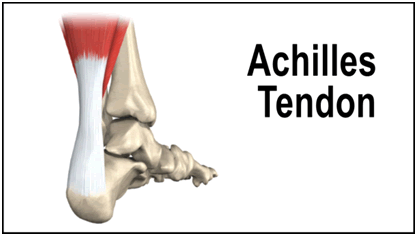 After jogging during a vacation in Florida, Michigan governor Rick Snyder reportedly felt a "pop" in his right foot. Following visits with doctors in both Florida and Michigan, the Republican governor has discovered that his right Achilles tendon is torn. Snyder says jogging is part of his Healthy Michigan, but has told The Detroit News that he "overdid it." According to spokeswoman Sara Wurfel, Snyder describes the pain as "not horrible." The Michigan governor has been mentioned as a potential candidate for the 2016 presidential election. When asked about running, he responded that he's "working on literal running first."
After jogging during a vacation in Florida, Michigan governor Rick Snyder reportedly felt a "pop" in his right foot. Following visits with doctors in both Florida and Michigan, the Republican governor has discovered that his right Achilles tendon is torn. Snyder says jogging is part of his Healthy Michigan, but has told The Detroit News that he "overdid it." According to spokeswoman Sara Wurfel, Snyder describes the pain as "not horrible." The Michigan governor has been mentioned as a potential candidate for the 2016 presidential election. When asked about running, he responded that he's "working on literal running first."
Achilles tendon injuries can be very painful. If you believe you are having problems with this condition, consult with Dr. Joshua David Scoll of Pennsylvania. Dr. Scoll can treat your foot and ankle needs.
What is the Achilles Tendon?
The Achilles tendon is a tendon that connects the lower leg muscles and calf to the heel of the foot. It is the strongest tendon in the human body, and is essential for making movement possible. Because this tendon is such an integral part of the body, any injuries to it can cause severe difficulties and should immediately be presented to a doctor.
What are the symptoms of an Achilles Tendon Injury?
There are various types of injuries that can affect the Achilles tendon. The two most common are Achilles tendinitis and ruptures of the tendon.
Achilles Tendinitis Symptoms
- Inflammation
- Dull to Severe Pain
- Increased blood flow to the tendon
- Thickening of the tendon
Rupture Symptoms
- Extreme pain and swelling in the foot
- Total immobility
Treatment and Prevention
Achilles tendon injuries are diagnosed by a thorough physical evaluation. Often the doctor will order an MRI to confirm the diagnosis. Treatment will involve rest, physical therapy, and in some cases, surgery. However, various preventative measures can be taken to avoid these injuries.
For more information about Achilles Tendon Injuries, follow the link below.
If you have any questions, please contact our offices located in Philadelphia and Bensalem, PA. We offer the newest diagnostic and treatment technologies for all your foot and ankle injuries.
